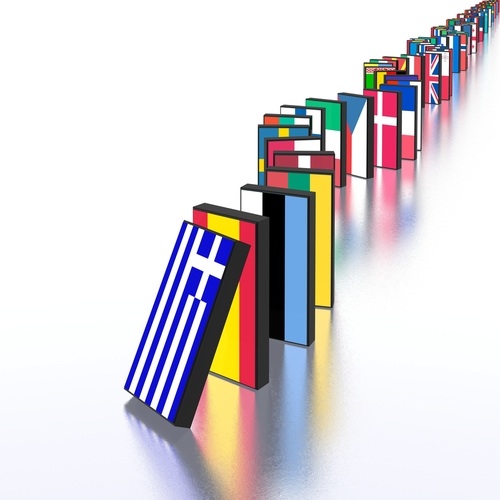
In response to protests against the country’s massive budget cuts, protesters set fire to a bank in Athens, Greece, which killed three and injured several more. Protesters used paving stones and Molotov cocktails to attack police, who eventually responded with tear gas.
The fire brigade said the bodies were found in the wreckage of a Marfin Bank branch, on the route of the march in the city center.
An estimated 100,000 people took to the streets during nationwide strikes to protest austerity measures imposed as a condition of bailout loans from the International Monetary Fund and other eurozone governments to keep heavily indebted Greece from defaulting on its debts.
Heavily indebted is an understatement. Greece’s financial troubles have been well publicized and the most recent edition of The Economist puts its budget deficit at 13.6% and its debt equal to 115% of GDP, with a prediction that it will reach 149% of GDP by 2014. Striking numbers to say the least.

Graph courtesy of Economist.com
Further complicating the country’s debt crisis is the fact that most of its citizens refuse to “endure the cuts in wages and services needed to make the economy competitive.” But those cuts in salaries and pensions and increases in consumer tax are necessary to keep Greece from all-out bankruptcy, which some see as not far off.
And Greece’s financial troubles are effecting already-troubled countries such as Portugal, Spain and Ireland. To get into the intricacies of the financial problems those countries face would take up seven pages of this blog. But the troubles are not isolated to just the euro-zone. It was announced today that Canada’s dollar dropped to a one-month low on concern Greece’s debt crisis is spreading.
“Continued developments in Greece are leading to risk aversion in other markets,” said Matthew Perrier, Toronto-based director of foreign exchange at Bank of Montreal, the nation’s fourth-largest lender. That’s driving the Canadian dollar lower, according to Perrier.
The EU, obviously, is working to calm fears, insisting that what’s happening within Greece is a “unique case.” Even with words meant to calm, Spanish and Portuguese bonds and stocks have fallen this week “on fears that they may likewise have trouble repaying their debt and that the eurozone would have to extend even larger bailouts to them.” As of now, the IMF is granting Greece a $144 billion bailout package. But will it cure the crisis?
Let’s hope The Economist is wrong when they said “Greece looks bust.”
UPDATE: Stocks on Wall Street plunged in response to the Greek debt crisis and the chaos it has spawned. As the New York Times states:
In a matter of minutes, the Dow Jones industrial average tumbled about 565 points, losing almost 1,000 points on the day. The Standard & Poor’s 500-stock index and the Nasdaq followed suit. Computer programs intensified the selloff as market fell through some limits.
It was the biggest intraday loss since the market crash of 1987 for the Dow Jones.
The selloff didn’t last long, however. Almost as quickly as the indices sank, they rebounded — at least somewhat. As of 3 p.m., the Dow was down 461.54, the S&P was down 50.56 and the Nasdaq was down 108.90.
